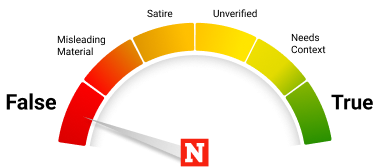A team of scientists are claiming to have found evidence that the COVID-19 virus was man-made, fueling speculation and some previously debunked narratives to resurface.
COVID-19, the disease caused by the Sars-CoV-2 virus, is an infectious respiratory illness that spread rapidly across the world in early 2020 as part of a pandemic that caused much of the world to go into lockdown.
"The results of our study show that this virus is 99.9 percent an artificially created copy of a natural virus", Valentin Bruttel, a scientist from the University Hospital of Würzburg and author of the paper, told EuroNews Weekly. Bruttel and his colleagues have published their findings as a pre-print, which has not yet been peer reviewed by the scientific community.

The Claim
According to EuroNews Weekly, Bruttel said that he noticed anomalies in the Sars-CoV-2 genome in 2021, and once he began studying the virus's genome, he found patterns apparently consistent with synthesized viruses.
There is, according to Bruttel, "a high probability [Sars-Cov-2] could have arisen as an infectious clone collected in vitro".
The claim soon spread on social media, including Twitter and Reddit, but does it really shift the scientific consensus on this subject?.
New Study Claims To Have Determined Covid-19 Origin
— 🇷🇺Jacob🇷🇺Charite🇷🇺 (@jaccocharite) October 24, 2022
The virus that caused the Covid-19 pandemic was most likely created in a laboratory, a study by German and American scientists has claimed.
1/ pic.twitter.com/BpBSZnwffY
The Facts
The publication of the paper, the latest in a string of studies making similar assertions, including some debunked ones, has been met with caution and skepticism in the scientific community.
The first obvious point to note is that, being a pre-print, the paper has not undergone peer-review and cannot tilt any established thinking on the issue until it has. There are other problems with it, too.
"There seems to be flaws in the logic of this paper in terms of why one would stitch a whole genome together piece by piece to manufacture a virus," Hassan Vally, an associate professor in epidemiology at Deakin University, told Newsweek.
"This to me makes no sense. If you were doing what the authors are purporting happened, you would insert small amounts of manufactured genetic material into a largely intact virus genome and there would be no need to piece together a genome in small segments. This doesn't make sense and points to a fundamental flaw in this paper and the logic behind the interpretation."
According to Vally, the logic of this paper is not sound and the recurring motifs in the genome may not represent what the researchers say they represent.
Other scientists in the field have responded to the preprint online, debunking the claims made by Bruttel and his colleagues.
Alright, I had a look last night and will quickly do a thread on it.
— Alex Crits-Christoph (@acritschristoph) October 21, 2022
There are many kinds of 'wrong' in science, but this preprint is False. There are many reasons (links at end), but the main one: the “unusual” sites are all *exactly* found in natural bat coronaviruses. 1/n https://t.co/2IrCemHPG8
Conspiracy theories along these lines emerged nearly as soon as the virus did, and have plagued the science behind treatment and vaccines throughout the pandemic.
"Theories on biological weapons peaked twice. At the beginning of the pandemic when people tried to link COVID-19 to biological weapons, and at the onset of active vaccination campaign when people discussed whether vaccine is a biological weapon," Dmitry Erokhin, a research assistant at the The International Institute for Applied Systems Analysis, which published a paper on COVID-19 conspiracy theories, told Newsweek.
According to Erokhin, the researchers found that "fear and distrust drive people to try and find a seemingly logical explanation for the emergence of the pandemic and band together with like-minded individuals on different aspects of the pandemic, forming so called "echo-chambers" consisting of, for example, pro- and anti-vaccine groups."
A recent preprint purported to show that SARS-CoV-2 is of synthetic origin, but it is so deeply flawed that it wouldn’t pass kindergarten molecular biology.
— Kristian G. Andersen (@K_G_Andersen) October 21, 2022
Below is an analysis with more relevant SARSr-CoV genomes, including the inferred recCA from @jepekar.
Very short 🧵. pic.twitter.com/uOUrL3bqcv
Conspiracy claims, therefore need rigorous scientific testing to debunk. The current scientific consensus is that Sars-CoV-2 was originally an animal-based disease that jumped to humans from bats somewhere in China.
"While its important that all questions are asked and explored, there are some researchers that display motivated reasoning on this and a number of other issues and this is why these studies needs to reviewed by experts who are objective and who can assess both the appropriateness of the methodology and the appropriateness of the conclusions drawn," Valley said.
The Ruling

False.
Scientific consensus is that there is very little evidence to suggest that Sars-CoV-2, the virus causing the COVID-19 disease, was man-made or created in a lab.
Once Bruttel and his colleagues' paper has been peer reviewed by other scientists in the field, and if it stands up to scrutiny, the consensus may change, but similar claims in the past failed to shift the needle on the issue.
FACT CHECK BY NEWSWEEK
Uncommon Knowledge
Newsweek is committed to challenging conventional wisdom and finding connections in the search for common ground.
Newsweek is committed to challenging conventional wisdom and finding connections in the search for common ground.
About the writer
Jess Thomson is a Newsweek Science Reporter based in London UK. Her focus is reporting on science, technology and healthcare. ... Read more





